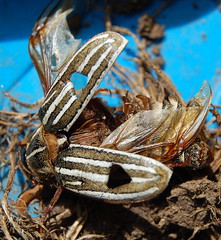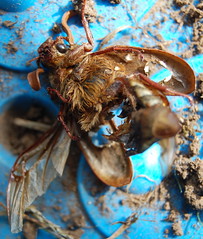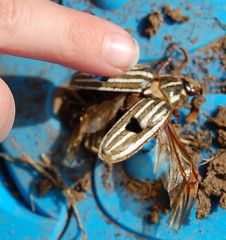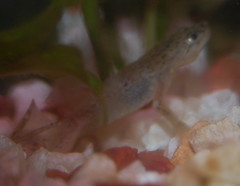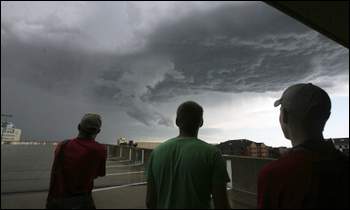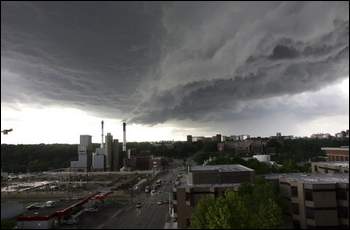Anybody who knows a professional print journalist — and I know a few — knows that there is a growing sense of panic in the industry. Readership is in a death spiral, along with ad revenue. Owners of big city dailies — mostly large conglomerates now — are reacting by slashing newsroom staff. Our own local daily, The Oregonian, announced buyouts this summer for at least 100 full-time employees (a story I broke here, later picked up by Willamette Week and Oregon Media Insiders, and much later reported in The O itself).
In the throes of this existential crisis, it’s easy for journalists to blame the Internet. That’s where all the classified ads went (Craig’s List), and it’s also where readers, especially young readers, go for 24×7, up-to-the-minute news coverage and analysis. Who wants a pile of dead-tree paper on their porch with yesterday’s news?
Big city dailies like The O have been slow to adapt to the new media landscape (you may notice that I’m not linking to any Oregonian stories here, for the simple reason that they don’t provide online access to their archive), but even those papers with great Web sites are struggling. That’s because there is a revolutionary change afoot, well beyond the shift of medium from print to electronic.
This shift is every bit as important as the introduction of movable type was, and in much the same way. The difference is in scale.
Now, almost anybody in an industrialized nation can own or borrow a digital printing press. The implications for democracy are stunning, as evidenced by the sudden and lasting impact of Web-based organizations like MoveOn.org and the online fund raising and network-building efforts of insurgent Democratic candidate Howard Dean in 2004.
In the realm of information dissemination, bloggers have created an echo chamber for issues of concern to them and their candidates, keeping stories alive that would otherwise die in a 24-hour news cycle. But until recently, they mostly acted like aggregators, not reporters, simply repeating and amplifying news gleaned from traditional sources.
But the trend now is toward doing actual journalism, albeit with a well-defined point of view.
People who have faith in objectivity in journalism take umbrage at this, but objectivity is an artificial construct. Every story you read in every newspaper has a point of view, whether or not it is obvious. (Eric Alterman covered this issue in more depth in the New Yorker last March.)
Mainstream news gathering organizations have built-in biases, largely a result of their advertisers and their proximity to the powerful; their pretension to the contrary just makes things worse. Prime examples from Oregon’s biggest daily include sitting on the Bob Packwood and Neil Goldschmidt stories, certainly two of the biggest stories of modern Oregon political history.
Especially regarding issues of social justice, pretending to give “balanced” coverage is absurd. There is no point in giving equal time to proponents of injustice.
Which is why I find the emergence of ProPublica refreshing.
ProPublica is an independent, non-profit newsroom that will produce investigative journalism in the public interest. Our work will focus exclusively on truly important stories, stories with “moral force.” We will do this by producing journalism that shines a light on exploitation of the weak by the strong and on the failures of those with power to vindicate the trust placed in them.
ProPublica is setting a standard higher than current mainstream dailies, something it can afford to do with its private, independent funding. With its emergence, the death of traditional dailies is easier to take. After all, classified ads, obituaries, comics and lifestyle sections don’t do much to advance democracy.
Investigative journalism in the public interest does advance democracy, and it’s something the dailies long ago cut way back on.
But most blogging doesn’t rise to the level of ProPublica. Instead, at its best, the blogosphere offers the opportunity for citizen journalists to report on narrowly defined vertical topics — like a local school district, for example. While most bloggers in this realm, myself included, don’t do it full time and thus can’t do the in-depth reporting, they can offer a constant attention to issues that keep professional journalists focused.
As a citizen journalist in Portland, I’ve had productive relationships with professional journalists at the Portland Tribune and Willamette Week on issues concerning Portland Public Schools. We frequently feed off of each others’ stories, and together produce a body of work that has a clear point of view on one hand, and also a firm basis in factual reporting.
My relationship with reporters at The Oregonian, though, has been much more arm’s length. Their extreme caution in covering public schools belies a clear bias against challenging the status quo. So in their attempt to show no bias (i.e. by refusing to do significant investigation into actual, ongoing, documented injustice), they show a significant bias.
They also assure the continued demise of their newspaper.
At the end of the day, the new media landscape means that “what is news” is no longer determined by middle-aged, middle class white guys behind closed doors in a downtown office building. They’re no longer the only ones buying ink by the barrel, and they can no longer suppress news that goes against the interest of their friends and advertisers.
Now that digital ink is virtually free, Democracy is better served. Women in particular, who for ages have been treated like second-class citizens by the dailies (look at the resources poured into sports coverage), have flourished in the blogosphere. There’s something out there for everybody, which only makes the anemic efforts of the dead tree newspaper to appeal to women less relevant.
The big city daily represents an outmoded mindset, delivered in an environmentally destructive form. As long as organizations like ProPublica are around, along with the traditional journals of opinion like The Nation, alternative papers like Willamette Week, and a healthy blogosphere, I’m cautiously optimistic that the death of the big city daily is not necessarily a bad thing.
The professional journalist will not only survive, but become stronger and more respected, happily co-existing in a symbiotic relationship with the citizen journalist.
Note: The Society of Professional Journalists of Oregon and Southwest Washington is hosting Building a Better Journalist 2008 this weekend at the University of Oregon’s School of Journalism and Communication in Eugene, with an emphasis on the Internet. ProPublica managing editor Steve Engelberg is the featured speaker. I am also on the program (to the shock and surprise of some journalist friends), taking part in a panel discussion on blogging, along with Bike Portland‘s Jonathan Maus and Loaded Orygun‘s Mark Bunster, moderated by Willamette Week news editor Hank Stern.
